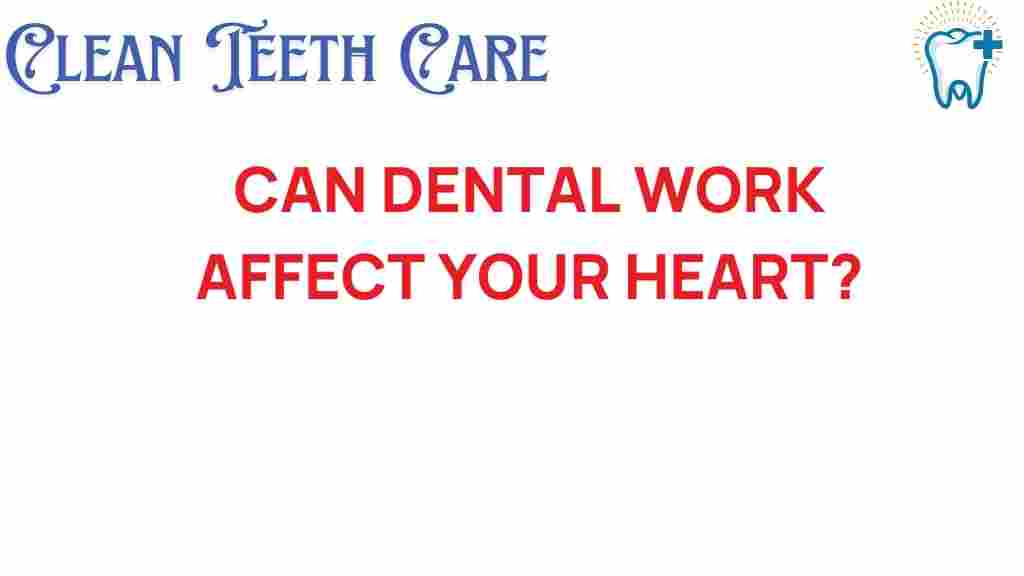Can Dental Work Really Impact Your Heart Health?
When we think about maintaining our heart health, regular exercise and a balanced diet often come to mind. However, a less obvious factor that can significantly affect our cardiovascular well-being is our dental work. The connection between oral hygiene and heart health has become a topic of increasing interest in recent years. This article explores how dental treatments can influence cardiovascular disease, the role of bacteria and inflammation, and what you can do to maintain both your oral and heart health.
The Link Between Dental Work and Heart Health
Research has revealed a compelling link between poor oral hygiene and the risk of developing cardiovascular disease. The mouth is a gateway to the body, and harmful bacteria from gum disease can enter the bloodstream, leading to inflammation and other health issues.
- Gum Disease: Also known as periodontal disease, this condition is a common result of inadequate dental care. It leads to inflammation in the gums and can create a breeding ground for harmful bacteria.
- Bacteria in the Bloodstream: When you have gum disease, bacteria can easily enter the bloodstream. This can trigger an immune response that may lead to chronic inflammation throughout the body.
- Impact on Heart Health: Chronic inflammation is a significant risk factor for various heart conditions, including coronary artery disease and heart attacks.
How Does Gum Disease Affect Your Heart?
Gum disease is more than just a dental issue; it can have serious implications for your overall health. Here’s a closer look at how it can affect your heart:
- Inflammation: The body’s response to infection in the gums can lead to systemic inflammation, which is a known contributor to heart disease.
- Blood Clots: Bacteria from gum disease may contribute to plaque buildup in arteries, increasing the risk of blood clots.
- Heart Valve Infections: In severe cases, bacteria can infect heart valves, leading to a condition known as endocarditis, which can be life-threatening.
The Importance of Oral Hygiene
Maintaining good oral hygiene is vital for preventing gum disease and protecting your heart health. Here are some essential practices:
- Regular Brushing: Brush your teeth at least twice a day with fluoride toothpaste.
- Floss Daily: Flossing helps remove food particles and plaque from between your teeth.
- Routine Dental Visits: Schedule regular check-ups and cleanings with your dentist to catch any issues early.
- Healthy Diet: Limit sugary foods and drinks that can contribute to tooth decay and gum disease.
- Avoid Tobacco: Smoking or using tobacco products increases the risk of gum disease.
Understanding Dental Treatments
Various dental treatments can help maintain your oral health, thereby supporting your heart health. Here are some common procedures:
- Teeth Cleaning: Professional cleaning removes plaque and tartar buildup, preventing gum disease.
- Fillings: Treating cavities prevents bacteria from entering the bloodstream.
- Root Canals: This procedure treats infected pulp, eliminating a source of bacteria in the mouth.
- Gum Treatments: Scaling and root planing help manage gum disease and reduce inflammation.
Step-by-Step Oral Health Routine
Implementing a consistent routine can greatly improve your oral hygiene and, by extension, your heart health. Follow these steps:
- Brush: Brush your teeth thoroughly for two minutes twice a day.
- Floss: Use dental floss or interdental brushes daily.
- Rinse: Use an antibacterial mouthwash to help reduce plaque.
- Eat Wisely: Incorporate crunchy fruits and vegetables to help clean teeth naturally.
- Stay Hydrated: Drink plenty of water to help wash away food particles and bacteria.
- Visit Your Dentist: Schedule appointments every six months for cleanings and check-ups.
Troubleshooting Common Dental Issues
Even with a solid oral health routine, issues can arise. Here are some common dental problems and how to address them:
Cavities
If you notice sensitivity or pain in your teeth, you may have a cavity. Here’s what to do:
- Schedule an appointment with your dentist.
- Maintain good oral hygiene to prevent further decay.
- Consider fluoride treatments, as recommended by your dentist.
Gum Inflammation
Swollen or bleeding gums can indicate gum disease. To manage this:
- Increase your oral hygiene efforts.
- Use a warm saltwater rinse to help soothe inflammation.
- Consult your dentist for a professional cleaning.
Bad Breath
Persistent bad breath may be a sign of oral health issues. To combat this:
- Brush your tongue to remove bacteria.
- Stay hydrated and avoid dry mouth by chewing sugar-free gum.
- If the issue persists, consult your dentist for further evaluation.
Tooth Sensitivity
If you experience pain when consuming hot or cold foods, address sensitivity by:
- Using toothpaste designed for sensitive teeth.
- Avoiding overly hot or cold foods.
- Consulting your dentist for possible treatments.
Conclusion
In conclusion, the impact of dental work on your heart health is significant and cannot be overlooked. By prioritizing oral hygiene and addressing any dental issues promptly, you can reduce the risk of cardiovascular disease linked to bacteria and inflammation. Regular dental visits and proper care are essential components of a holistic approach to health. Remember, when you take care of your mouth, you’re also taking care of your heart.
For more insights on maintaining a healthy lifestyle, check out our article on healthy living tips. To learn more about the connection between oral health and heart disease, visit the American Heart Association’s page on heart health.
This article is in the category Conditions and created by CleanTeethCare Team
